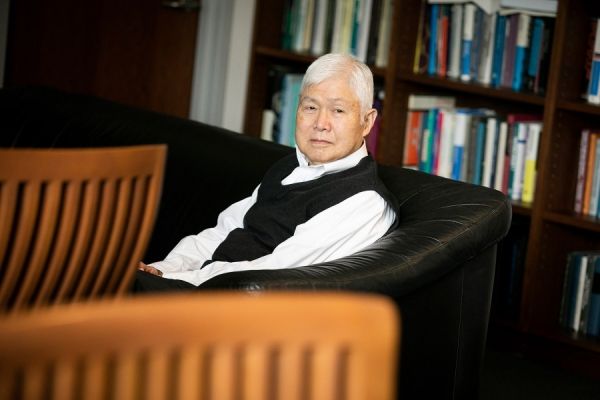It’s a feat three decades in the making: Harvard University chemists have achieved what a new paper calls a “landmark in drug discovery” with the total synthesis of halichondrin. Known to be a potent anti-cancer agent in mouse studies, and found naturally in sea sponges — though only in minuscule quantities — the halichondrin class of molecule is so fiendishly complex that it had never been synthesized on a meaningful scale in the lab.
Led by Yoshito Kishi, Morris Loeb Professor of Chemistry Emeritus in Harvard’s Department of Chemistry and Chemical Biology, researchers have now synthesized sufficient quantities of E7130, a drug candidate from the halichondrin class, to enable for the first time rigorous studies of its biological activity, pharmacological properties, and efficacy, all conducted in collaboration with researchers at Japanese pharmaceutical company Eisai.
The molecule has undergone unusually rapid development and is already being tested in a Phase I clinical trial in Japan, under a license from Harvard’s Office of Technology Development (OTD) to Eisai. The company hopes to begin a second clinical trial in the U.S. in due course. The Kishi Lab’s results, driven to completion through an intense, three-year research collaboration with Eisai, are published today in Scientific Reports, an open-access Nature journal. The paper reports the total synthesis of the highly potent halichondrin molecule E7130 — 11.5 grams of it, with 99.81 percent purity —and characterizes its mode of action. In preclinical studies, the research team has identified it not only as a microtubule dynamics inhibitor, as was previously recognized, but also as a novel agent to target the tumor microenvironment.
Read more at Harvard University
Image: Led by Morris Loeb Professor of Chemistry Yoshito Kishi, chemists at Harvard and Eisai, a Japanese pharmaceutical company, have synthesized halichondrin, a potent anti-cancer agent found naturally in sea sponges. (Credit: Stephanie Mitchell/Harvard Staff Photographer)


